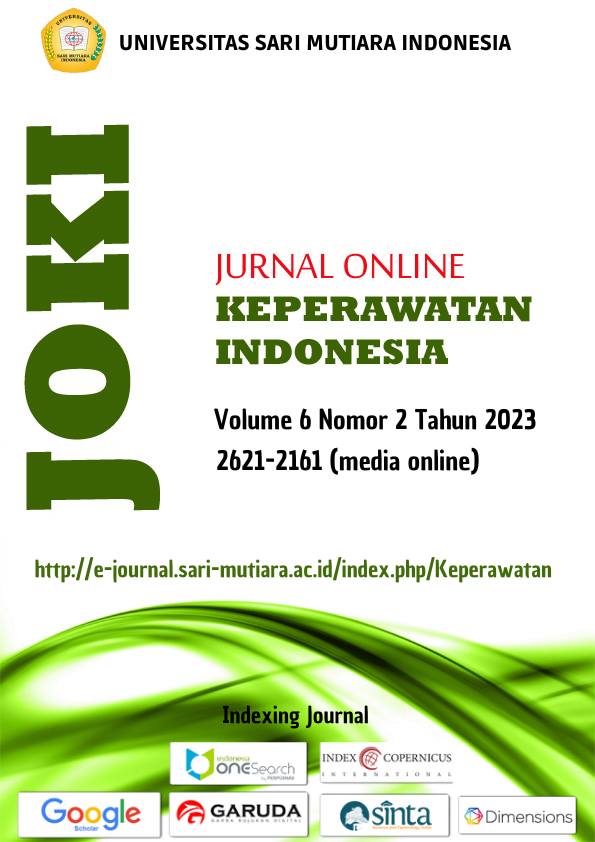EXPERIENCE OF DISASTER NURSING SIMULATION BASED ON THEORY PLANNED BEHAVIOUR (TPB) IN THE CITY OF MEDAN
Main Article Content
Abstract
Disaster is an event or series of events that threaten and disrupt people's lives and livelihoods caused by both natural and/or non-natural factors. Medan North Sumatera is one of the regions in Indonesia with a potential disaster that has the worst impact. Preparing the community to face a disaster has a very important role in mitigating the impact of a disaster. A nurse needs to have knowledge and skills regarding disaster and disaster management. The purpose of this study was to explore experience of disaster nursing simulation based on theory planned behaviour (TPB) in the city of medan. Methods The research uses qualitative methods. The population in this study were nurses in the city of Medan with the 9 participants, selected only 9 had been interview with saturate data. The themes explored through are on Theory Planned Behavior. The themes of the research results obtained are: General Attitude, Religiosity, Socio Cultural, Experience, Attitude Toward Behaviour, Subjective Norm, Perceived Behaviour Control, Intention, Behaviour. With this Disaster Nursing Simulation, many nurses already have the provision of knowledge about disaster management, disaster response attitudes, and then when a disaster occurs, them are involved when a disaster occurs. The themes obtained influence a person to behave and have an intention in disaster response, but in the end it is not necessarily someone who wants to take disaster response actions according to their intentions.
Downloads
Article Details

This work is licensed under a Creative Commons Attribution-ShareAlike 4.0 International License.
References
Ajzen, I. (2005). Attitudes, Personality and Behavior. New York. USA: Open University Press
Fishbein, M. and Ajzen, I. (2010). Predicting and Changing Behavior: The Reasoned Action Approach. Psychology Press (Taylor & Francis) : New York.
Haryati, T. D. (2013). Emotional Maturity, Religiosity, and Prosocial Behavior of Nurses in Hospitals: Enchantment. Journal of Indonesian Psychology. Vol 2, No. 2, pp. 162-172
Holdo, G. (2017). Disaster Nursing : Looking To The Future In Norway. 7(3),431–442. https://doi.org/10.2495/SAFE-V7-N3-431-442
Holdo, G. (2021). Disaster Nursing or Nursing in Disaster : A Case Study Approach to Investigate the Future Requirements of Disaster Nursing in Norway. February.
Jacobs-wingo, J. L., Schlegelmilch, J., Berliner, M., Airall-simon, G., & Lang, W. (2018). Emergency Preparedness Training for Hospital Nursing Staff , New York City , 2012 – 2016. 1–7. https://doi.org/10.1111/jnu.12425
Loke, A. Y., Wai, O., & Fung, M. (2014). Nurses ’ Competencies in Disaster Nursing : Implications for Curriculum Development and Public Health. 3289–3303. https://doi.org/10.3390/ijerph110303289
Oun, M. A., & Bach, C. (2014). Qualitative research method summary. Journal of Multidisciplinary Engineering Science and Technology, 1(5), 151–161. https://www.jmest.org/wp-content/uploads/JMESTN42350250.pdf
Toward, P. A. (2016). Alcohol Use in College : The Relationship Between Alcohol, Journal of Religion and Health. Springer US. doi: 10.1007/s10943-016- 0210-2.
Yan, Y. E., Turale, S., Stone, T., Petrini, M. (2015). Disaster nursing skills, knowledge and attitudes required in earthquake relief: Implications for nursing education. International Nursing Review, 62(3), pp. 351–359. doi: 10.1111/inr.12175
